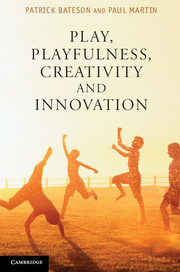Book contents
- Frontmatter
- Contents
- Advance praise
- Preface
- Acknowledgements
- 1 Introduction
- 2 The biology of play
- 3 The functions of play
- 4 Evolution and play
- 5 Creativity in humans
- 6 Animals finding novel solutions
- 7 People and organisations
- 8 Childhood play and creativity
- 9 Humour and playfulness
- 10 Dreams, drugs and creativity
- 11 Pulling the threads together
- Notes
- References
- Index
9 - Humour and playfulness
Published online by Cambridge University Press: 05 July 2013
- Frontmatter
- Contents
- Advance praise
- Preface
- Acknowledgements
- 1 Introduction
- 2 The biology of play
- 3 The functions of play
- 4 Evolution and play
- 5 Creativity in humans
- 6 Animals finding novel solutions
- 7 People and organisations
- 8 Childhood play and creativity
- 9 Humour and playfulness
- 10 Dreams, drugs and creativity
- 11 Pulling the threads together
- Notes
- References
- Index
Summary
Humorous people often behave playfully and playful people tend to have a good sense of humour. At face value, play and humour are connected. Further consideration reveals some shared underlying features. Play and humour both occur in protected contexts, where the rules of engagement are somehow different from ‘serious’ behaviour. They are both intrinsically motivating and enjoyable for their own sake. They are both accompanied, at least in some instances, by a distinctive positive mood. And they both involve combining things in unusual ways. Like play, humour is associated with the generation of novel and occasionally fruitful ideas and therefore can be highly creative.
Charles Darwin (1877) saw the connection between humour and play when he kept careful notes on the development of his first child, William Erasmus. Like many parents before him and since, he found that the game of peek-a-boo generated great amusement and laughter-like gurgling in his child. He wrote: ‘I was at first surprised at humour being appreciated by an infant only a little above three months old, but we should remember how very early puppies and kittens begin to play.’ The educational psychologist Nina Lieberman (1977), who worked on creativity in schoolchildren, also saw a link between humour and playfulness. Indeed, she used humour as part of her definition of playfulness in the children she studied.
- Type
- Chapter
- Information
- Play, Playfulness, Creativity and Innovation , pp. 103 - 109Publisher: Cambridge University PressPrint publication year: 2013



